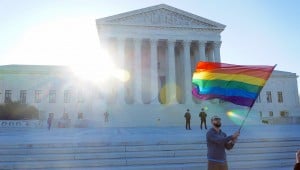The Supreme Court Has Only Scratched The Surface Of Awful
Gay rights? Contraception? Interracial marriage? None of that is settled law anymore.

(Photo by Ted Eytan / Flickr)
Now that people with uteruses are no longer guaranteed autonomy over their own bodies, the natural query is what’s next on the Supreme Court’s to-do list? After all, Samuel Alito’s draft opinion in Dobbs demonstrates the five Supreme Court justices in the majority — and likely the chief justice’s nowhere land of a concurrence — have signaled they DGAF. They’re doing whatever they want with the majority they have, and we’re all about to be way worse off for it.
So, what will the Court (likely) do now that the blatant power grab is accomplished? Be warned this is the most appropriate response to everything I’m about to write.

Legal AI: 3 Steps Law Firms Should Take Now

Well, let’s start off with what Alito explicitly flags as next on the agenda — gay rights. (Folks who want to behave like ostriches and insist that gay rights are not on the chopping block, PLEASE, listen when conservatives tell you how they intend on remaking the country. The only folks who are truly *shocked* by the draft decision are those who refused to believe all the evidence in front of them — I’m looking at you Susan Collins. Oh, and the jackholes who are more interested in pearl clutching over the leak instead of the substance of the draft opinion.)
In the draft decision Alito criticizes both Lawrence v. Texas and Obergefell v. Hodges as similar to Roe and Casey as the rights protected in those cases are not “deeply rooted in history.” So, coming soon to a red state near you, expect laws that outlaw sodomy and gay marriage as the Court has signaled they’re willing to upend stare decisis on these issues.
Speaking of the right to marry whomever you choose, interracial marriage could also become a thing of the past. The attorney behind Texas’s “heartbeat bill” abortion ban, Jonathan Mitchell, has already made rumblings about Loving v. Virginia. While he later appeared to backtrack he did write, “To be sure, the rationale of Loving purported to invoke the doctrine of substantive due process and a supposed constitutional ‘freedom to marry,’ which is nowhere to be found in the language of the Constitution.” Which is far from a good omen.
Sponsored

The Business Case For AI At Your Law Firm


Is The Future Of Law Distributed? Lessons From The Tech Adoption Curve

Navigating Financial Success by Avoiding Common Pitfalls and Maximizing Firm Performance

The Business Case For AI At Your Law Firm

Other rights based on substantive due process, such as birth control, also look weak right about now. Basically if you enjoy any rights that were not around during the founding of this country, you’re right to be pretty worried.
But even before an explicit overruling of Griswold , there’s still plenty of damage that can be done, as Cornell Law professor Michael Dorf notes:
Some forms of contraception prevent implantation of a fertilized egg. The Alito draft in Dobbs does not purport to overrule the Court’s decisions finding a constitutional right to contraception. Would the application of an abortion ban to such methods of contraception be sustained under the rational basis test of Dobbs? Or would they be covered by the right to contraception?
And in case you thought this Dobbs decision was as low as we can go for reproductive freedom, well, nope:
Roe and Casey held that even after fetal viability, laws forbidding abortion were constitutionally required to include an exception for abortions necessary to preserve the life or health of the pregnant woman. Does government have a rational basis to prefer fetal life over a pregnant woman’s life? Or does a higher standard of scrutiny apply in such cases? If so, on what basis? Even if the Court finds a constitutional right to a life-saving abortion, what about abortions necessary to preserve health? What level of risk will legislatures be permitted to impose on women compelled to continue their pregnancies?
Sponsored

Legal AI: 3 Steps Law Firms Should Take Now

Early Adopters Of Legal AI Gaining Competitive Edge In Marketplace
And then we get into the legally unrelated, but still politically important issues the majority of the Court may now be emboldened to tackle.
Within two months, the Court could find a constitutional right to carry loaded guns on the New York City subways. Within a little over a year, the Court will likely forbid all race-based affirmative action. In due course, the Court’s Republican-appointed super-majority could find that Republican state legislatures are constitutionally empowered to disregard the results of a presidential election based on evidence-free claims of fraud.
Turns out, rock bottom has another, deeper bottom. And that’s where we’re living.
 Kathryn Rubino is a Senior Editor at Above the Law, host of The Jabot podcast, and co-host of Thinking Like A Lawyer. AtL tipsters are the best, so please connect with her. Feel free to email her with any tips, questions, or comments and follow her on Twitter (@Kathryn1).
Kathryn Rubino is a Senior Editor at Above the Law, host of The Jabot podcast, and co-host of Thinking Like A Lawyer. AtL tipsters are the best, so please connect with her. Feel free to email her with any tips, questions, or comments and follow her on Twitter (@Kathryn1).







